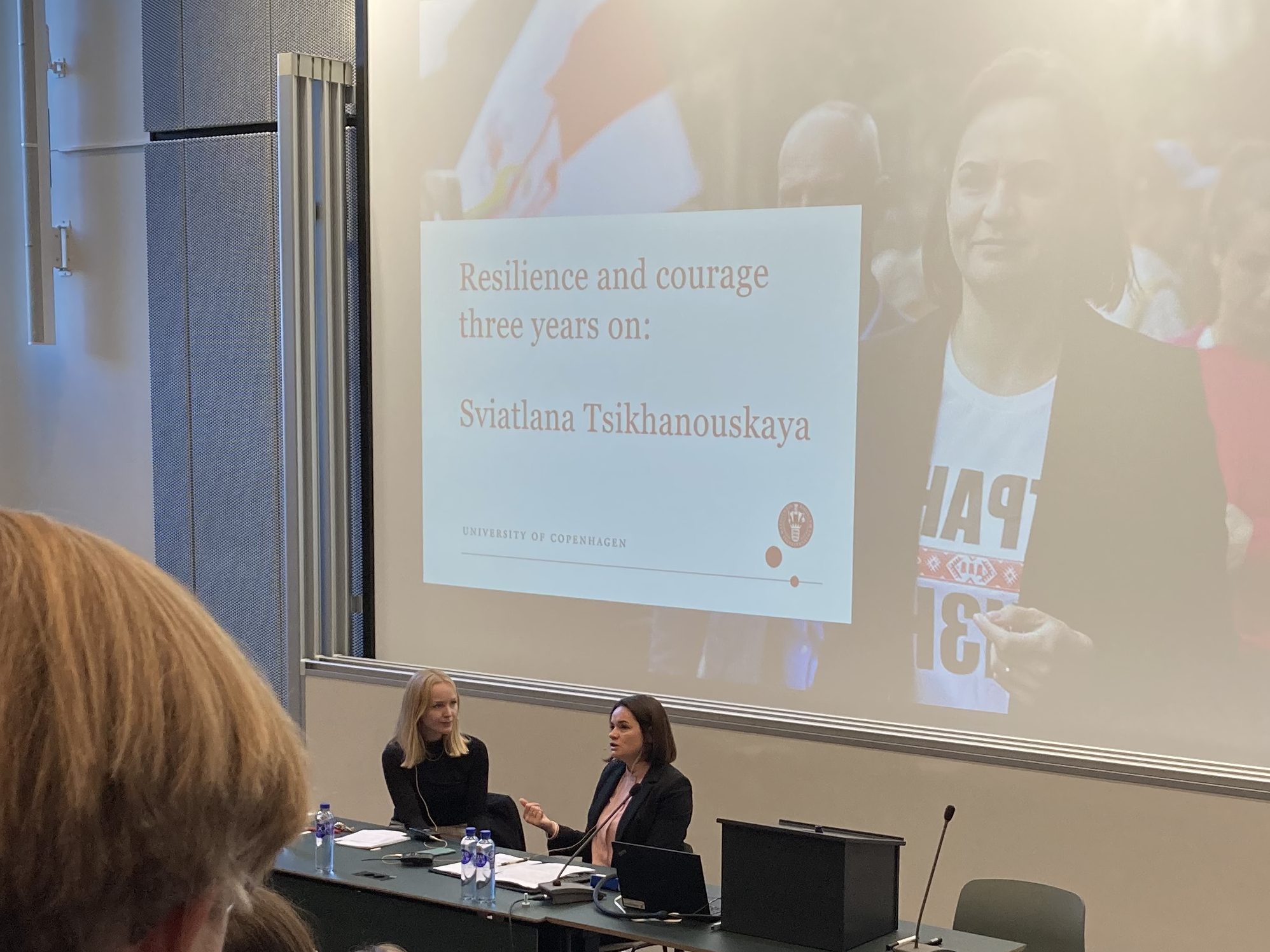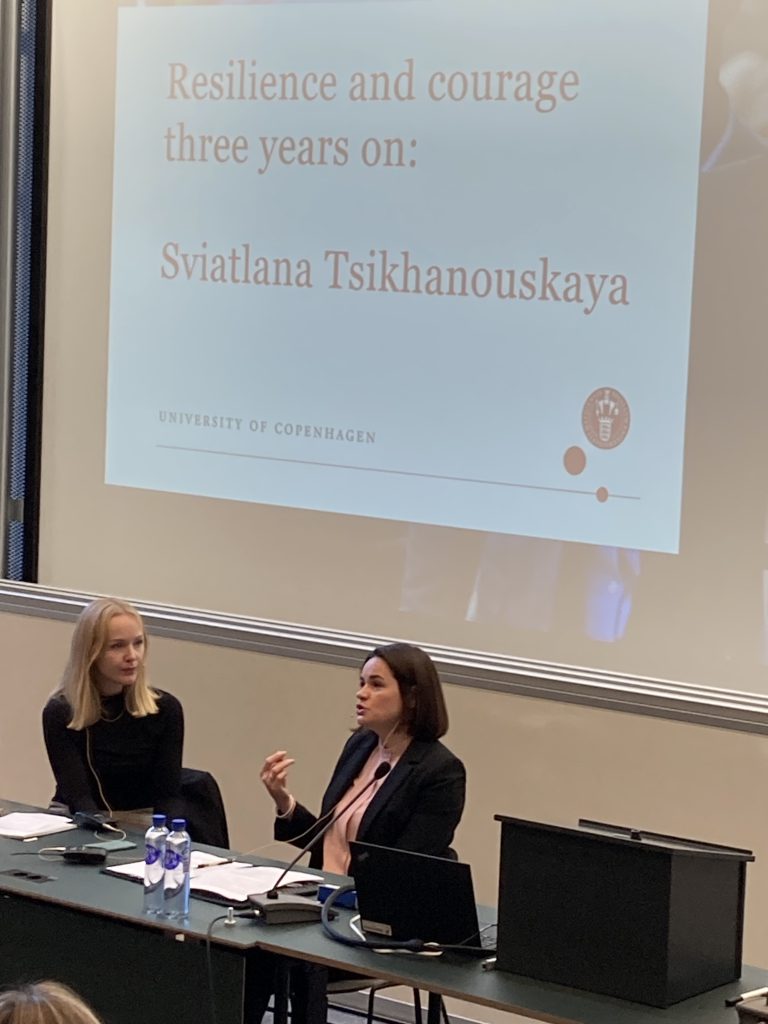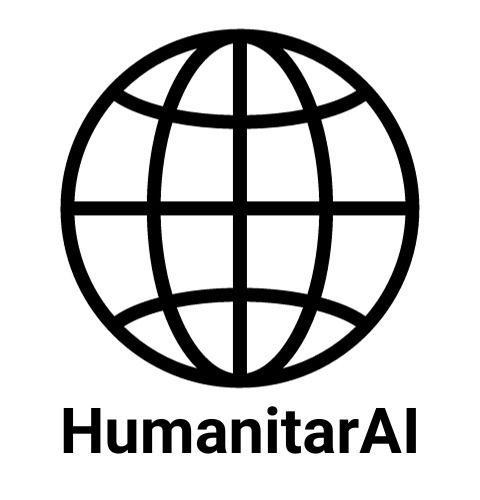On October 9, Belarusian oppositional leader Sviatlana Tsikhanouskaya visited the University of Copenhagen for an open lecture “Resilience and courage three years on”. Discussion covered topics about why she decided to run for the presidential elections in Belarus 2020, the current laws in the country that targets media and engagement and upcoming problems that Europe (and world) will face due to the new Belarusian passport renewal limitation law.

Sviatlana Tsikhanouskaya at the open lecture at the University of Copenhagen, October 9, 2023. Photo credit: author
Cutting access online and offline
Data is a powerful tool. In fact, The Economist in 2017 wrote that “The world’s most valuable resource is no longer oil, but data” (Economist, 2017). However, “while data driven discrimination is advancing at a similar pace to data processing technologies, awareness and mechanisms for combating it are not” (Taylor, 2017, p.2).
At the open lecture, Tsikhanouskaya talked about two recently passed laws in Belarus which both use data knowledge to target political opposition, by limiting people’s free access to information and opportunities. How a “like” on Instagram post and soon to be expired passport can put you in jail?
Online
UN Universal Declaration of Human Rights Under Article 19 states:
- Everyone has the right to freedom of opinion and expression; this right includes freedom to hold opinions without interference and to seek, receive and impart information and ideas through any media and regardless of frontiers.
One way to use data against people is to monitor their online interactions and engagements. In Belarus, the regime uses the “Anti-extremism” law to monitor media and social media and oppress political change. According to ARTICLE 19, Human Constanta, Access Now, and World Organisation Against Torture (OMCT) submission: ‘Anti-extremism’ rules are found all across Belarusian laws and are actively used to clamp down on online and offline speech – persecuting high-profile democratic activists, journalists, human rights defenders, administrators of Telegram chats, authors of protest art.”
So, what happens when you follow an exile media on Facebook or engage with a post of an opposition leader? “Any form of interaction with civil initiatives whose participants do not support the policy of the regime, including fundraising, information transfer, participation in interviews, were actually outlawed “ ARTICLE19 reports . Your engagement is being monitored and your actions can be criminalized. Tsikhanouskaya in the lecture confirms that people can be jailed for interacting with content labeled as extremist. Just for a “like” or “share” on Instagram or comment under a YouTube video, people can get imprisoned.
Belarusian Human Rights Center “Viasna” reports on many cases where journalists and internet activists are facing jailed terms for “promoting extremist activities”. For example, “Siarhei Nikitsiuk, a musician from Žabinka, commented with “A windbag” under a Belsat TV post on social media featuring a quote from Lukashenka” (How The Authorities in Belarus Persecute Readers and Journalists of “Extremist” Media, 2023). Siarhei received 3-year general-security imprisonment term for “insulting” Belarusian leader Lukashenka.
Since August 23rd, 2023, Human Rights Center “Viasna” is labelled as an “extremist formation”.
In some countries, independent media and activists are reliant on social media. However, how an independent media can reach the people in the communities that are monitored by authoritative regimes? If engagement on social media platforms could be seen as disobedience and the possibility to start political uprising, then any engagement with social media content put people at direct risk. Consequentially, involving local communities, getting their input on possible change and communication for development becomes less possible.

Sviatlana Tsikhanouskaya at the open lecture at the University of Copenhagen, October 9, 2023. Photo credit: author
Offline
Another way to use data against people is by limiting their freedom of movement.
UN Universal Declaration of Human Rights Under Article 13 states:
- Everyone has the right to freedom of movement and residence within the borders of each state.
- Everyone has the right to leave any country, including his own, and to return to his country.
Just recently, Belarus regulations have introduced the “Passport law”. Human Rights Watch reports that at the beginning of September 2023, “Belarus has issued a presidential decree denying the country’s citizens the ability to obtain or renew their passports or to process other essential documents at Belarusian consulates overseas” (“Belarus: Decree Puts Exiled Citizens at Risk,” 2023).
”In two to three years there will be a half million stateless people”
Sviatlana Tsikhanouskaya
In regards to this law, at the lecture Tsikhanouskaya notes that Belarusians and the international community are facing a huge upcoming problem with legitimization. ”In two to three years there will be a half million stateless people” she notes. This leaves Belarusians who have left the country for political reasons i.e., exiled Belarusians, at high risk, as returning to Belarus to exchange their passports could mean a jail sentence. Data on passport renewal could be used for monitoring anti-regime opposition and further targeting the opposition for ” politically motivated prosecution if they have to return to Belarus to process their documents”(“Belarus: Decree Puts Exiled Citizens at Risk,” 2023).
However, Tsikhanouskaya introduces the auditorium with an initiative by the Belarusian opposition – “New Belarus passport”. A document that could potentially be recognized as a valid document in European Union (RFE/RL’s Belarus Service, 2023). She notes that this could be a unique event in the world, where political opposition of a country creates legal documentation that can be recognized elsewhere in democratic world.

Sviatlana Tsikhanouskaya at the open lecture at the University of Copenhagen, October 9, 2023. Photo credit: author
Conclusion
One click here and one click there. One click for an independent news agency in Belarus can lead you to prison. In my previous post, I asked “If political unrest is suppressed in the streets, can people still be active and safe in the digital world?”. In the case of Belarus, the data has been used against the people and digital uprising and movements are less possible from the inside of the country.
However, are there positive examples of how data and social media can empower local communities? Can real-time data support ComDev and Humanitarian work? In the following blog articles, I will keep to explore how social media, datafication and AI is being used in the conflict areas and situations.
References:
Belarus: “Anti-extremism” legislation used to further suppress civil society – ARTICLE 19. (2023, June 6). ARTICLE 19. https://www.article19.org/resources/belarus-anti-extremism-legislation-used-to-further-suppress-civil-society/
Belarus | Country Page | World | Human Rights Watch. (2022, June 7). https://www.hrw.org/europe/central-asia/belarus
Belarus: Decree puts exiled citizens at risk. (2023, September 8). Human Rights Watch. https://www.hrw.org/news/2023/09/08/belarus-decree-puts-exiled-citizens-risk
Full submission. ARTICLE 19. (2023, June 6). https://www.article19.org/wp-content/uploads/2023/06/SR-Input-Anti-extremism-Belarus_HC_A19_AN_OMCT.pdf
How the authorities in Belarus persecute readers and journalists of “extremist” media. (2023, August 30). spring96.org. https://spring96.org/en/news/112626
Livni, E. (2023, January 15). What is ‘Shadow Banning’? The New York Times. https://www.nytimes.com/interactive/2023/01/13/business/what-is-shadow-banning.html
Not quite the Arab Spring: how protestors are using social media in innovative ways. (n.d.). Reuters Institute for the Study of Journalism. https://reutersinstitute.politics.ox.ac.uk/news/not-quite-arab-spring-how-protestors-are-using-social-media-innovative-ways
President.gov.by (2023). https://president.gov.by/bucket/assets/uploads/documents/2023/278uk.pdf
Taylor, L. (2017). What is data justice? The case for connecting digital rights and freedoms globally. Big Data & Society, 4(2), 205395171773633. https://doi.org/10.1177/2053951717736335
The Economist. (2017, May 11). The world’s most valuable resource is no longer oil, but data. The Economist. https://www.economist.com/leaders/2017/05/06/the-worlds-most-valuable-resource-is-no-longer-oil-but-data
RFE/RL’s Belarus Service. (2023, August 7). Self-Exiled Belarusian opposition members present “New National Passport.” RadioFreeEurope/RadioLiberty. https://www.rferl.org/a/belarus-new-national-passport-opposition/32537440.html
United Nations. (n.d.). Universal Declaration of Human Rights | United Nations. https://www.un.org/en/about-us/universal-declaration-of-human-rights
Viasna has been recognized as an “extremist formation”: how to cooperate with us now? (2023, September 5). spring96.org. https://spring96.org/en/news/112678


